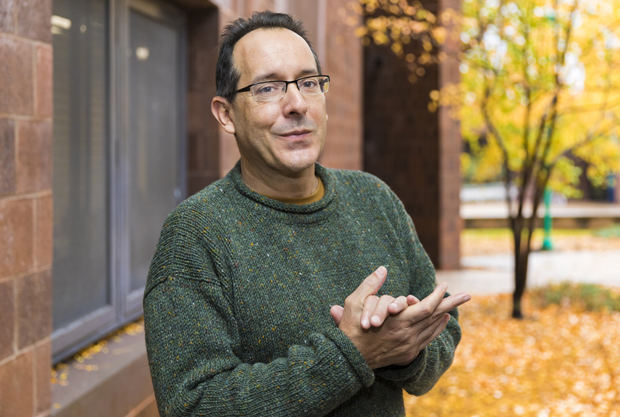Stephen Ortiz likes the ‘vibe’ of College-in-the-Woods
History faculty member is new CIW collegiate professor

Stephen Ortiz has a new moniker in his role as College-in-the-Woods collegiate professor.
Meet “C.P. Steve.”
“I have tried to come up with a name so (students) aren’t calling me Dr. Ortiz or Professor Ortiz,” the associate professor of history said. “Some of them feel weird calling me Steve. So I am known now as ‘C.P. Steve’ in the community.”
Whether it is working with the College-in-the-Woods (CIW) staff, interacting with students or leading and developing courses, “C.P. Steve” has made an impact on a community that has been a Binghamton University staple since 1972.
“I’ve always liked the vibe,” Ortiz said of CIW. “It’s cozy and eclectic. Its space and atmosphere is conducive to chance interactions.”
Ortiz began his involvement with CIW in the spring of 2015 as a faculty-in-residence. He taught a class to CIW students called “The Roosevelts and Leadership” that was tied to Ken Burns’ PBS documentary at the time. Ortiz returned the following fall in the faculty-in-residence position, offering advice to students during lunch sessions in the CIW Dining Hall.
The spring of 2016 was spent collaborating with longtime CIW Collegiate Professor Tony Preus, who was stepping down from the position. Preus helped Ortiz prepare to become collegiate professor and stressed CIW traditions such as Casino-in-the-Woods and Woods Olympics.
“Tony was terrific and generous in helping me figure out what the position is and how things work,” Ortiz said.
Ortiz developed a new learning community called Politics, Law and Society that offers CIW students the opportunity to take a two-credit class in the fall on U.S. presidential elections and return in the spring for workshops, video trailers and other projects.
“There is a tight-knit community around their common interests in electoral politics and public policy,” he said. “Students have a lot of personal investment in this. The students are interesting, energetic and fun to work with.”
Next semester, Ortiz will also coordinate a course in CIW’s Feeding Our Hungry World program. He plans to establish another learning community – International Relations and Cultural Exchange – in 2017-18 that will feature a class called “World War I and the Origins of Humanitarianism.”
“While I’m only teaching one class of my formal (history) responsibilities, I continue to teach in broad and different ways that are fun and exciting,” said Ortiz, who still serves on graduate committees and works with honors thesis students in the History Department. “You can stretch yourself a little bit and do some things that are meaningful for students.”
Ortiz is able to reach out to CIW students who aren’t taking classes in the learning communities by leading a Tuesday-night event called “Lounging With C.P. Steve.” Ortiz believed that the weekly sessions were needed, as his CIW office is not easy to access for students. The sessions also help students – especially first-year students – become comfortable with talking to faculty members.
“We have four buildings and I rotate every week on a Tuesday evening into one of the buildings for an hour,” he said. “The first rotation was introducing myself to the residents. The second session was midterm preparation.
“Ideally, I’d have a kiosk in the courtyard! But this is a way of getting into the students’ space so that they see me and don’t have to (immediately) seek me out.”
Ortiz said he expects more students to visit his office and discuss academic topics such as registration as they get to know him.
The layout of CIW – with courtyards between the residential halls – provides a “meaningful, centrally located” place for communication, Ortiz said.
“There is a lot of walking by one another in the courtyards,” he said. “I’m a big believer in how the built environment can facilitate communication and interaction. College-in-the-Woods has that in a much greater way than the newer residential communities.”
Ortiz said he has received great support from the University’s other collegiate professors.
“Hinman and CIW are now the bedrocks of the old traditions,” he said. “I’m especially indebted to Al Vos (collegiate professor of Hinman College). We have a like-minded approach and we have similar types of residential communities with similar profiles of students. Not only did Tony help me learn, but I’ve got Al as a mentor.”
Ortiz also stressed that he has been impressed with the CIW staff, from Erin Kentos (assistant director of Residential Life) to the four residential directors and a team of residential assistants.
“The (RAs) are mature, responsible people on the front lines of helping students any way they can,” he said. “And yet they are doing amazing things in the classroom, in research, athletics, music. They are out there doing it.”
As collegiate professor, Ortiz has already noticed a difference in his observation of students: He has learned how human they are.
“I was always aware in a vague sense that students’ lives outside of our classrooms are complex,” he said. “Often as professors, we have a vantage point of seeing them only in the classroom and thinking: ‘This should be the most meaningful thing in their lives. This is what college is.’
“College is so much more than that. Students learn so much about themselves outside of the classroom and outside of the gaze of professors. Our students live rich, complex and sometimes difficult lives. … So much of the growth, maturation and expansion of people’s horizons is not about what they learn in my class. It’s about what they learn in this (residential) community.”
